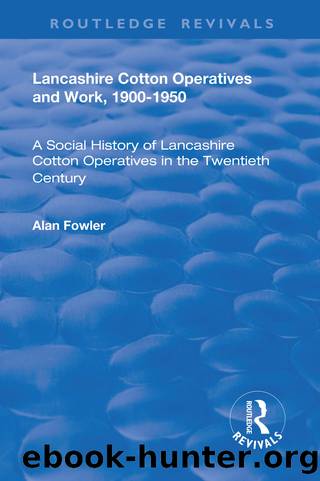Lancashire Cotton Operatives and Work, 1900-1950 by Alan Fowler

Author:Alan Fowler [Fowler, Alan]
Language: eng
Format: epub
Tags: History, General
ISBN: 9781351753203
Google: OH10DwAAQBAJ
Publisher: Routledge
Published: 2018-10-24T01:33:23+00:00
The weavers
The Weavers' Union had first introduced calculating examinations for their officials in 1861 when Thomas Birtwistle had been elected secretary of the weavers' first amalgamation (Cotton Factory Times, 29 March 1912). From this point most weavers' officials appear to have been selected this way although, like the spinners, they had to have a formal election. By 1910 the expansion of the Weavers' Amalgamation had made it the second-largest trade union in Britain. The union had over 30 full-time secretaries and in the larger weaving districts three or four people might be employed in the trade union office. This formed a much larger nucleus than the spinners, but there was a small group which formed an inner cabinet and made the key decisions. During the Edwardian period the first generation of weavers' leaders died or retired, though the most influential of these, Thomas Birtwistle, became a member of the factory inspectorate after the passing of the Wages Particulars Clause to the Factory Act because, according to the Webbs, he was the only person who understood the legislation (Webb and Webb 1901: 196). Following Birtwistle's retirement, David Shackleton, the first cotton trade unionist to be a Labour MP, became the leading weaving trade unionist. He left trade unionism in 1910 to take up an appointment as senior advisor to the Home Office and was the first working man to become a permanent secretary in the civil service. There can be no doubt that these two men achieved their appointments because of their technical knowledge of the cotton industry. It could be argued that for these two trade union activism was an extension of their self-help education which was eventually to lead to successful middleclass occupations (Cotton Factory Times, 30 September 1910).
David Shackleton (Marsden 1994; Martin 2000) was brought up in the Rossendale Valley beginning work as a half-timer and tenter at the age of nine. His father, a Sunday school teacher, encouraged him to continue his education and he regularly walked to Accrington Mechanics' Institute for evening classes, a town to which the family later migrated. At the Mechanics' Institute he learnt to calculate and when he became active on the Accrington Weavers' Committee he taught the association's calculating class giving classes in the evening in the Weavers' rooms to those who wished to know how to calculate their own sorts (Marsden 1994: 5). Active in both temperance reform and Liberal politics as well as trade unionism, Shackleton was elected secretary of the Darwen Weavers in 1894. He quickly became an influential figure in the Weavers' Amalgamation as vice president and in 1902 stood as Labour candidate for Clitheroe and was elected unopposed. By 1906 he was the most influential trade unionist in Parliament and between 1906 and 1910 was the main link between the Parliamentary Committee of the TUC and the Parliamentary Labour Party, playing a key role in the repeal of Taff Vale (Saville 1996: 11-45; Martin 2000: 71-3).
The most outstanding trade union leader in weaving from 1910, after
Download
This site does not store any files on its server. We only index and link to content provided by other sites. Please contact the content providers to delete copyright contents if any and email us, we'll remove relevant links or contents immediately.
Hit Refresh by Satya Nadella(9134)
The Compound Effect by Darren Hardy(8967)
Change Your Questions, Change Your Life by Marilee Adams(7782)
Nudge - Improving Decisions about Health, Wealth, and Happiness by Thaler Sunstein(7707)
The Black Swan by Nassim Nicholas Taleb(7129)
Deep Work by Cal Newport(7083)
Rich Dad Poor Dad by Robert T. Kiyosaki(6632)
Daring Greatly by Brene Brown(6513)
Principles: Life and Work by Ray Dalio(6449)
Playing to Win_ How Strategy Really Works by A.G. Lafley & Roger L. Martin(6306)
Man-made Catastrophes and Risk Information Concealment by Dmitry Chernov & Didier Sornette(6019)
Big Magic: Creative Living Beyond Fear by Elizabeth Gilbert(5771)
Digital Minimalism by Cal Newport;(5764)
The Myth of the Strong Leader by Archie Brown(5507)
The Slight Edge by Jeff Olson(5417)
Discipline Equals Freedom by Jocko Willink(5390)
The Motivation Myth by Jeff Haden(5212)
The Laws of Human Nature by Robert Greene(5208)
Stone's Rules by Roger Stone(5088)
